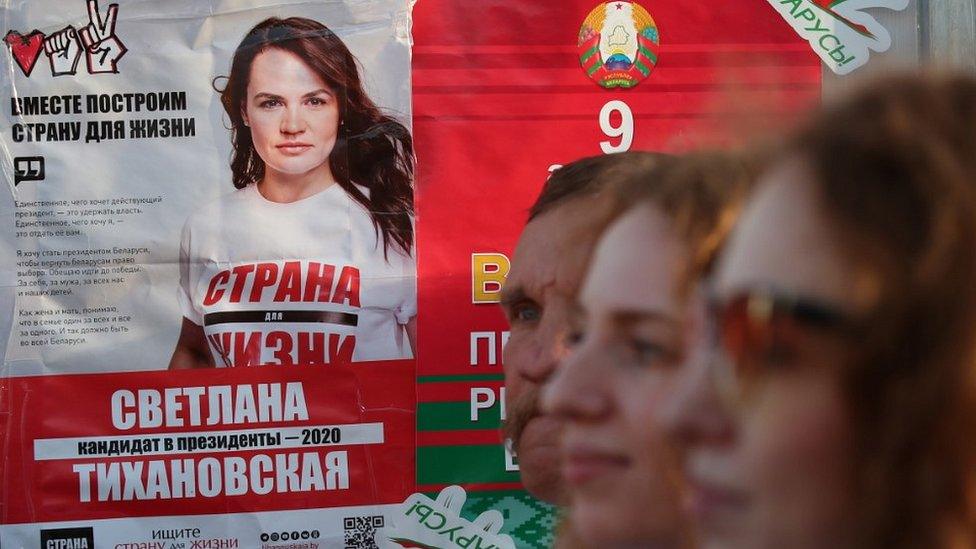Belarus election: Police use live fire on protesters in Brest
- Published
A BBC team in Minsk encountered violent scenes on Monday night
Police used live bullets when they came under attack during protests in Belarus, the interior ministry says.
As details of the incident in the south-western city of Brest emerged, the United Nations condemned the use of violence by authorities.
In the city of Gomel a man died after being arrested and kept in a police van, the second death in the unrest.
Protesters have accused police of brutality in the wake of Sunday's presidential election.
The protests erupted hours after Belarusian leader Alexander Lukashenko was declared the winner of the vote, which has been condemned by the EU as "neither free nor fair". The main opposition contender, Svetlana Tikhanovskaya, was then detained before being forced to leave for neighbouring Lithuania.
At least 200 protesters have been wounded, some seriously, and 6,000 detained. A BBC crew was also attacked by police on Tuesday evening.
UN human rights chief Michelle Bachelet said reports suggested "a trend of massive arrests in clear violation of international human rights standards", external.
EU 'considers sanctions'
Mr Lukashenko won 80% of Sunday's vote, according to election officials, but there were widespread allegations of vote rigging. EU foreign policy chief Josep Borrell said Belarusians had shown "the desire for democratic change" in the election campaign.
Sweden's foreign minister says EU foreign ministers will meet on Friday to discuss imposing sanctions on Belarus.
Lithuanian President Gintanas Nauseda said Lithuania, Poland and Latvia were prepared to mediate, provided Belarusian authorities stopped violence against protesters, release detained demonstrators and form a national council with members of civil society. The alternative, he warned, was sanctions.
US Secretary of State Mike Pompeo agreed the vote "was not free and fair", adding that the people "should be given the freedoms that they are demanding".
When Ms Tikhanovskaya went to the electoral committee on Monday evening to complain about the results that gave her just 10% of the vote, she was detained for seven hours. By Tuesday morning she had arrived in Lithuania.
Mr Borrell accused authorities of using "disproportionate and unacceptable violence".
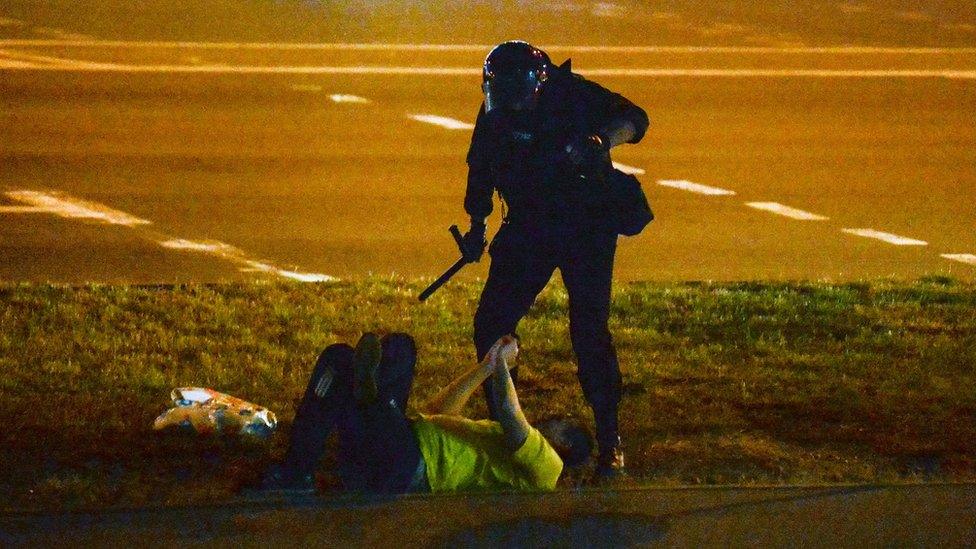
Riot police were seen beating protesters in several areas of Minsk
Fourth day of protests
Hundreds of women wearing white clothes and holding flowers turned out in Minsk on Wednesday to call for an end to police violence. A crowd of more than 100 people gathered earlier outside a prison waiting for news of their detained relatives and friends.
On Tuesday night alone, interior ministry spokeswoman Olga Chemodanova said more than 1,000 people were held and a number of police and security forces hurt during unrest in Minsk and other big cities.
In Brest, police were targeted by a "group of aggressive citizens with metal rods in their hands"; "firearms were used to protect the lives and health of the employees," she said.
The brutality of the crackdown has shocked observers. However, official newspaper Belarus Segodnya said the protest "co-ordinators" had been detained, including one Minsk resident said to have organised the "mass disturbances" from a hotel room.
The mother of the 25-year-old protester who died on Sunday in Gomel told Radio Liberty: "They refused to show me the body. I think he was severely beaten."
Investigators said the cause of death was unclear, according to AFP news agency. Officials had previously said one demonstrator had died on Monday when an explosive device went off in his hands.
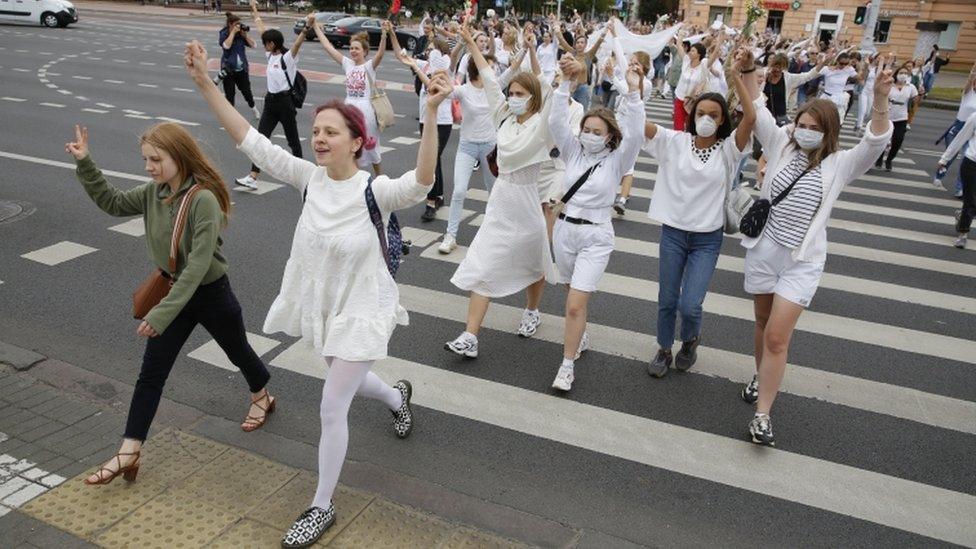
Women in Minsk rallied on Wednesday in support of detained protesters
At the scene in the capital
By Abdujalil Abdurasulov, BBC News, Minsk
Protesters gathered spontaneously on Tuesday night near Kammenaya Gorka metro station in central Minsk that quickly turned into a battleground of new clashes. Police fired tear gas and stun grenades before fanning out across the street to push demonstrators back.
Some people fell while trying to flee, but were quickly picked up by others running behind. Police chased them into the yards of apartment blocks where many tried to hide.
When they caught up with fleeing protesters, officers surrounded them and beat them violently with batons. Residents watching from their windows booed and swore at officers, shouting at them to leave. Someone even threw a wooden ladder at riot police who were beating a man under their window.
Earlier, our BBC team was also attacked by men dressed in black who appeared to be security forces. "Take the camera away," they shouted as they approached us. We showed them our government-issued accreditation, but one of the officers ripped our colleague's card from around her neck, took her camera and attempted to break it.
When we demanded the accreditation document be returned, one of them lashed out with his baton at us and our remaining camera. Luckily, none of the team was badly hurt and the camera remained intact.
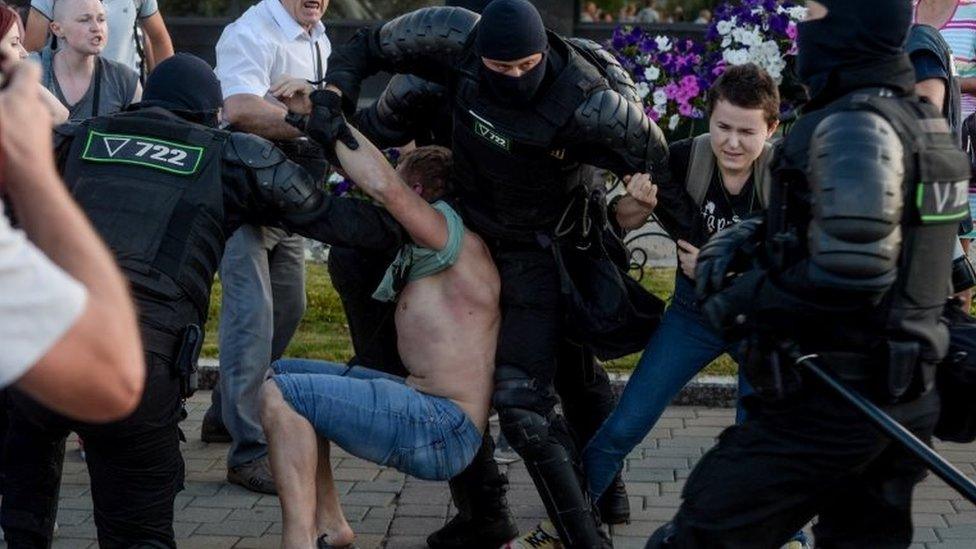
Protesters have accused riot police of brutality
Crackdown on media
Opposition website Tut.by said journalists were detained in the cities of Brest and Grodno, as well as in the capital. Many had their equipment broken or confiscated, while Tut.by said its own reporter and cameraman were targeted.
Mr Lukashenko, 65, who has ruled the former Soviet country since 1994, has described opposition supporters as "sheep" controlled from abroad. He also later claimed that most of the protesters were unemployed, Belta reported, and told them "in an amicable way" to get jobs.
There were some reports of workers going on strike but state media said it was fake news.
Websites, which have been jammed in Belarus for days, were widely reported to be back online on Wednesday morning. State TV has said little about the protests.
Meanwhile, several TV presenters have resigned in the wake of the vote. Tanya Borodkina of STV said she was standing down because she "could no longer smile on air". "Do not be afraid," she urged Belarusians on Facebook. "Do not deprive our children of their future!"
Yevgeny Perlin and Sergey Kozlovich both of Belarus 1 TV also said they had hosted their last shows. "What happened to my Belarus?" Perlin wrote on Facebook.
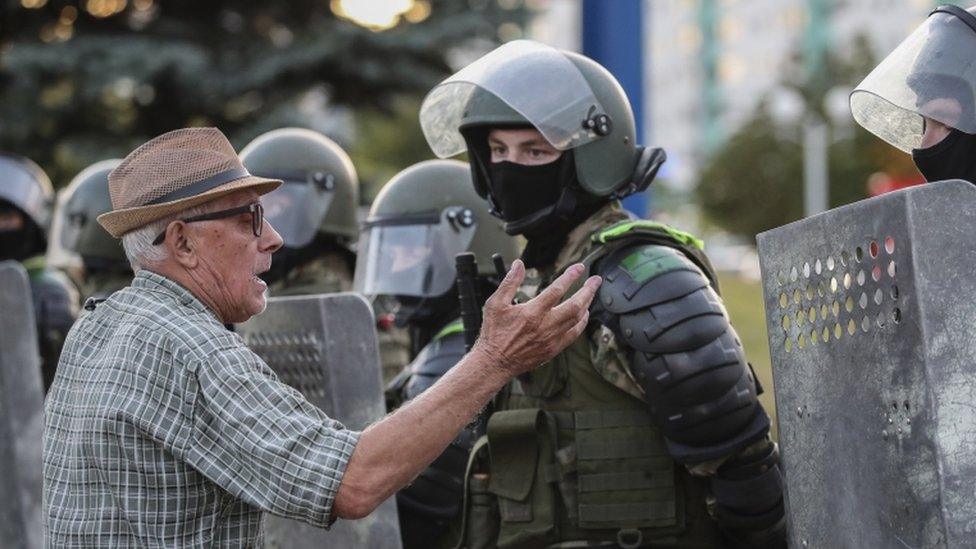
Protesters called on Belarus authorities not to use force
What has happened to the opposition?
Former teacher Svetlana Tikhanovskaya, 37, was a stay-at-home mother until she entered the race after her husband was arrested and blocked from registering for the vote.
She was one of three women who pooled their resources to spearhead the opposition. Veronika Tsepkalo fled Belarus on the day of the vote and Maria Kolesnikova remains in Belarus.
According to an associate, Ms Tikhanovskaya had been escorted from the country by the authorities as part of a deal to allow the release of her campaign manager, Maria Moroz, who was arrested on Friday evening.
Svetlana Tikhanovskaya: "Not one life is worth what is happening now"
After she had arrived in Lithuania a video appeared online in which she addressed supporters (in Russian), external, stating that she had overestimated her own strength.
"I thought that this campaign had really steeled me and given me so much strength that I could cope with anything," she said. "But I guess I'm still the same weak woman that I was."
"Not one life is worth what is happening now," she added. "Children are the most important things in our lives." Ms Tikhanovskaya had sent her children to Lithuania for safety before the election.
Allow X content?
This article contains content provided by X. We ask for your permission before anything is loaded, as they may be using cookies and other technologies. You may want to read X’s cookie policy, external and privacy policy, external before accepting. To view this content choose ‘accept and continue’.

A second video later emerged that appeared to have been made during her detention. The images show her, head lowered, reading nervously from a script as she urges her supporters to "obey the law" and stay away from street protests.
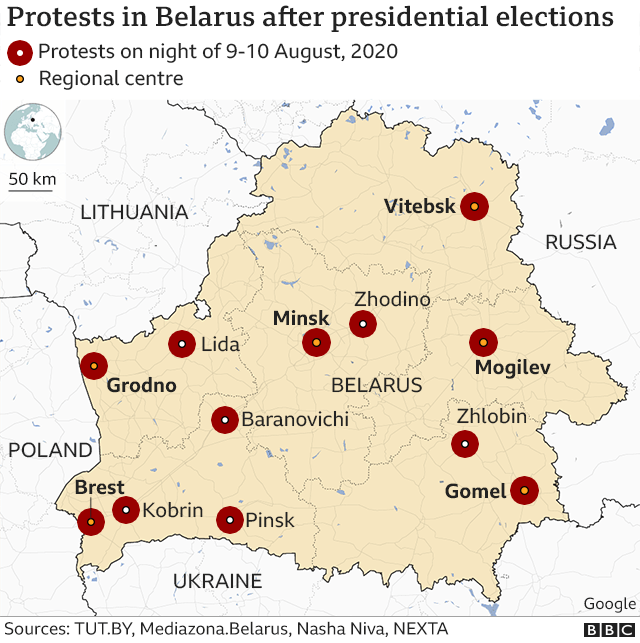

Ahead of Sunday's election, crowds flocked to opposition rallies, with Belarusians angered in part by the Lukashenko government's response to coronavirus.
The president has downplayed the outbreak, advising citizens to drink vodka and use saunas to fight the disease.
- Published12 August 2020
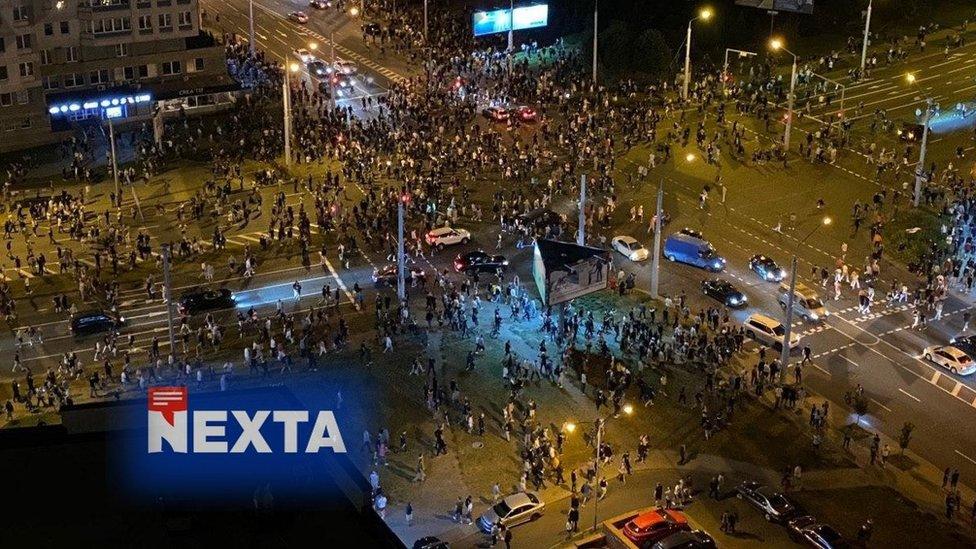
- Published7 August 2020
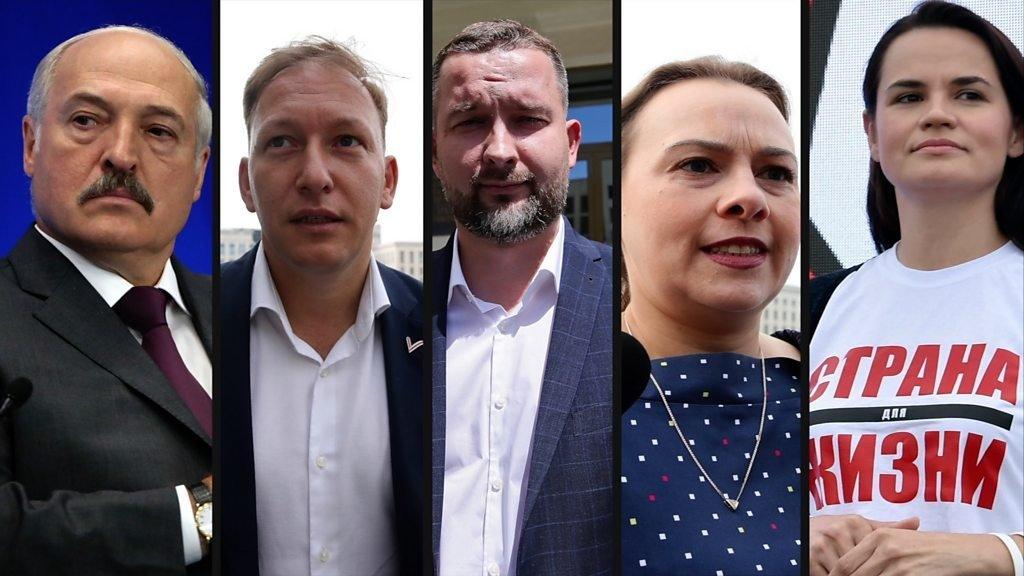
- Published1 August 2020
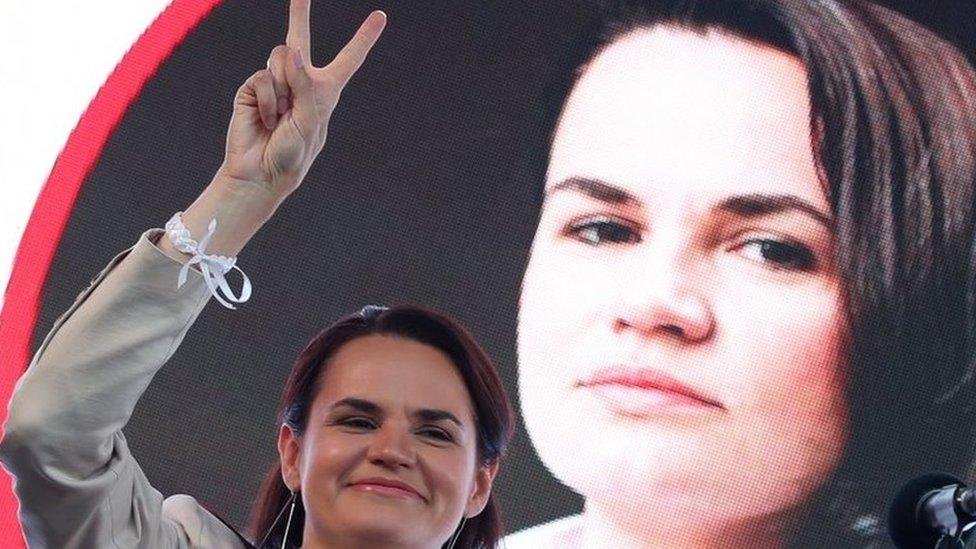
- Published7 August 2020
